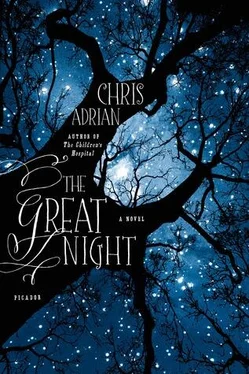T itania had always had a habit of taking a mortal lover after an argument with her husband. He did the same thing. It was soothing and distracting, a response to sadness or strife that was as natural as tears. So she ought to have taken one after he left her, and because it was the most terrible argument they had ever had, she ought to have taken a terribly good lover, or a terribly large number of lovers, or a lover who manifested a terribly extreme sort of mortality — an old man on his deathbed or a consumptive youth. When she imagined Oberon rutting his way through the city, forgetting her and their Boy in thrusting increments, she wanted to do it, too. She wanted to sweep down the hill in a rage and capture the first man she saw, and use him up, as she had done a thousand times before, leaving remnants that were more or less ruined, depending on the intensity of her rage and the intensity of the argument with her husband. So this time she considered, sulking and ruminating on her throne, that she could become a sickness among the men of this city, and take them by the dozen every night, until she had burned them all out, leaving them useless for life, if not dead, and still not exhaust her anger at Oberon or her grief for their Boy.
All her courtiers thought it was a good idea, too. It would reassure them for her to ride out on a horse made of fog and bring back a mortal to use, and the faeries tasked to carry away the man’s trembling bones would sigh complacently at one another and say, “At last she’s behaving normally again.” This was before she cloistered herself on the hill for fear of encountering a child in the street. A few faeries went ahead and tried to set her up, taking it upon themselves to forage among the houses and apartments that surrounded their hill for someone interesting or pretty. Some foraged for the sake of an anticipated reward, and some just out of fondness and concern for their afflicted Lady. They brought back images caught in water, which they held cupped in their hands for her to see, or caught on silk, to make waving flags for their cause. Oak came hopping up the hill with a stolen tennis shoe, which he held up for her to sniff. “His feet smell like peanut butter,” he said. “He is distinguished !”
The mortals all looked equally boring to her, equally plain, and looked to be equal wastes of her time. She had never thought before of anything as a waste of time; she had an eternity of time to spend and could afford to be profligate with it. But she went down the hill anyway, on three different nights, to meet three different men. The first was the youngest, a boy in his twenties. She found him on her own, passing down the sidewalk near the corner of Noe and Henry streets. He was about to go into his apartment. It was early in the evening, but the moon was high and full. Its light caught in his hair just so, and that was enough. She revealed herself to him.
“Come here,” she said, after he had stared for a while. He came down the steps, abandoning his key in the lock, and stood on his toes to kiss her. He tasted like sugar and ashes — the flavor of mortality common to all men which she usually found deeply arousing — but this time her tongue felt wooden in his mouth. What’s his name? she wondered, and then she asked him.
“Ralph,” he said breathily, speaking it against her lips and then against her neck and her chest. “Ralph, Ralph, Ralph.”
“That’s ridiculous ,” she said, because it was a ridiculous sound, a cough, a hairball, a bit of puking. Why did she care what his name was, or whether there was someone waiting for him in his apartment, or if he had a child, or had been a child himself once? She had never cared about any of these things. Mortal men, never to be told, asked her name, begged her name, died to know one letter of her name. She did not ask for anyone’s name.
She left him there to make a solitary spectacle of himself, laid out on his stoop and coming in his pants. He was barely ruined at all. He would recover, and forget about her, and be satisfied with mortal women, and never be troubled by her again except in deep dreams.
The second was older, a man in a suit. Lyon said it was a nice suit, though it was not made of smoke or dew or spider legs, and that he had picked the man for her largely on account of its quality. “Fine suit,” he said. “Fine man.” He was taller and darker than the blond boy, and he talked too much. She allowed him to talk; she had decided, reflecting on the experience with the blond boy, that it would be best to take her fill of his story before she took her fill of his body. And maybe, she thought, if she heard enough, if she drained his story out of him, she could enjoy his body without wondering about which portions of his life were given over to joy or to sadness, whether he had cried today, or whether he had a mother who had loved him when he was a child. “Your name is Minna,” said Lyon, who had taken it upon himself, rather boldly, to orchestrate the whole thing, and made the introduction through a computer, sending fake pictures over the wire in an internet café on the corner of Seventeenth and Sanchez. It was a proper date: Titania met him at a restaurant in his neighborhood, the Marina, and sat at an outside table.
“I’m the youngest person ever to head up my department,” he said. “In the whole history of the company, which has been around for like fifty-five years.” He paused to let her comment.
“My name is Minna,” she said. That was all she said to him all evening long, but he heard in it whatever he needed to. Maintaining this little glamour was easier than actually having to talk to him, and left her attention free to wander a little while he emptied himself out. She was considering how flat and treeless this neighborhood was. It ought to be one big beach, she thought.
“It’s hard work,” he said. “It comes home with me a lot, which is okay. There’s still time for fun. And when I have fun, I have fun. You know what I mean?”
“My name is Minna,” she said.
“Exactly!” he said, and started to tell her about his boat. She picked up a pea from her plate and breathed upon it to turn it into an acorn. She shook the acorn in her hand, and it divided with every shake, until she had a handful of them, which she tossed over her shoulder. They rolled away down the sidewalk, still dividing, in search of someplace to plant themselves. It cheered her a little, to think that there would be an improvement in the neighborhood. She sighed and watched her date. He had the rib of a pig in his hand. He wasn’t talking about what he was supposed to be talking about. She didn’t know anything about his previous experience of love, or if he had ever killed anyone, or if he liked sometimes to be cruel. He hadn’t mentioned his mother even once: it was possible that he didn’t even have one, and she thought for some reason that that would make him entirely useless to her. She could make him talk about those things. She could take away the nasal quality in his voice and make it more pleasing to hear. She could change the shape of his face, or grow him a beard as thick and luxurious as Oberon’s, and scent his hair like flowers, or even turn his hair into flowers. She could improve him, but she declined to improve him, though she had experimented on mortal men and women in the past, changing them, for their own good or to their detriment, but always to her amusement. Sitting there, watching his lips, glistening with pig fat, flap away in the gentle golden light of the early evening, she conceived the spell to change him but then let it go, because her Boy came to mind, the way the color of his hair changed from light to dark as he grew, and the way she could never tell which word he would learn next, and even the way she could never, in his last days, predict what new pain or trouble he would have — all his surprises ruined any satisfaction she might take in making someone to delight her, because those sorts of surprises were beyond the reach of her craft.
Читать дальше












